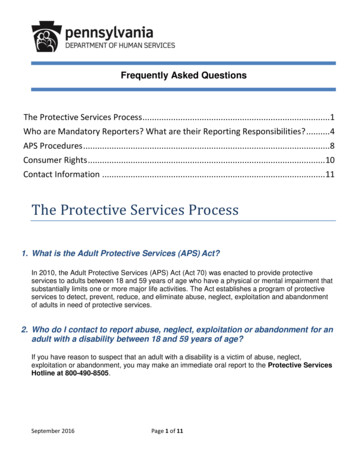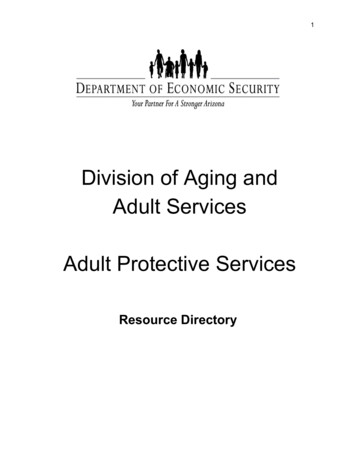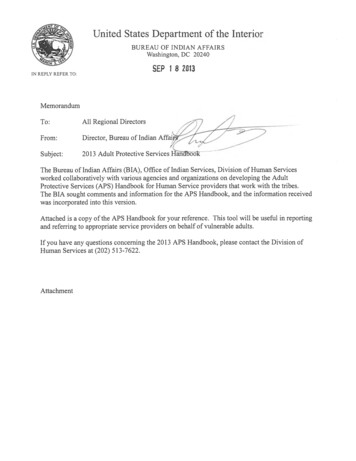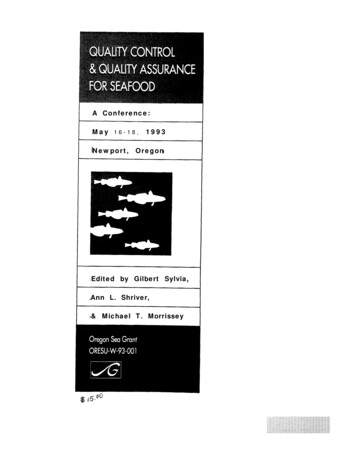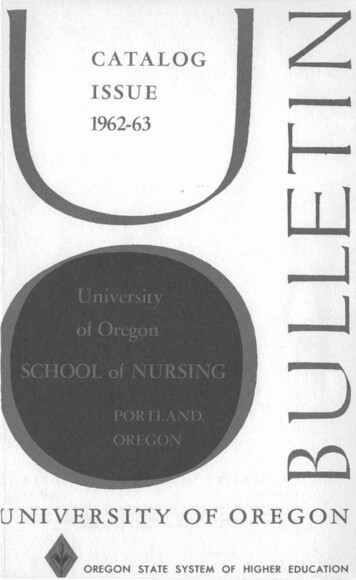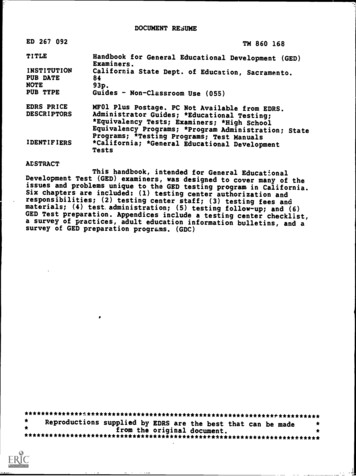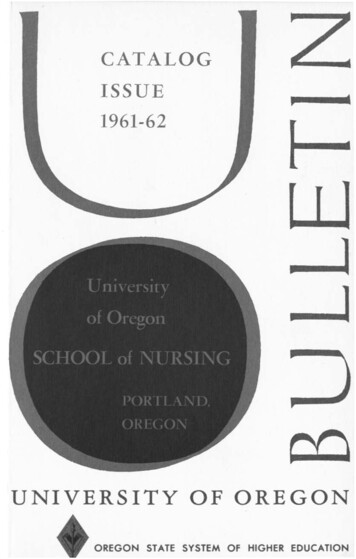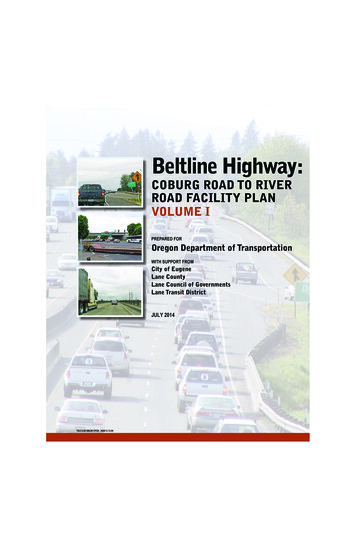
Transcription
DEPARTMENT OF HUMAN SERVICESADULT ABUSE PREVENTION AND INVESTIGATIONSOREGON ADMINISTRATIVE RULESCHAPTER 411DIVISION 20ADULT PROTECTIVE SERVICES -- GENERALTable of Contents(Amended 12/27/2018)411-020-0000 Purpose and Scope of Program (Amended 12/27/2018) . 1411-020-0002 Definitions (Amended 12/27/2018) . 2411-020-0010 Authority and Responsibility (Amended 12/27/2018). 13411-020-0015 Eligibility Criteria (Amended 12/27/2018) . 15411-020-0020 Reporting of Abuse and Self-Neglect (Amended 12/27/2018). 16411-020-0025 Multidisciplinary Team (MDT) (Amended 12/27/2018) . 17411-020-0030 Confidentiality (Amended 12/27/2018) . 18411-020-0040 Services Provided (Amended 12/27/2018) . 20411-020-0060 Screening (Amended 12/27/2018) . 21411-020-0070 APS Consultation (Amended 12/27/2018) . 23411-020-0080 Triage (Amended 12/27/2018) . 23411-020-0085 Law Enforcement Notification (Amended 12/27/2018) . 25411-020-0090 Assessment (Amended 12/27/2018) . 26
411-020-0100 Community Investigation, Documentation, and Notification(Amended 12/27/2018) . 27411-020-0110 Intervention (Amended 12/27/2018) . 31411-020-0120 Facility Investigation, Documentation, and Notification(Amended 12/27/2018) . 32411-020-0121 Administrative Closure (Adopted 12/27/2018) . 36411-020-0123 Accessing Protected Health Information, including Records(Amended 12/27/2018) . 39411-020-0126 Accessing Financial Records (Amended 12/27/2018) . 42411-020-0130 APS Risk Management (Amended 12/27/2018) . 44
DEPARTMENT OF HUMAN SERVICESADULT ABUSE PREVENTION AND INVESTIGATIONSOREGON ADMINISTRATIVE RULESCHAPTER 411DIVISION 20ADULT PROTECTIVE SERVICES -- GENERAL411-020-0000 Purpose and Scope of Program (Amended 12/27/2018)(1) RESPONSIBILITY. The Department of Human Services (Department),Aging and People with Disabilities program (APD) has the responsibility toprovide Adult Protective Services (APS) to older adults and to adults withphysical disabilities whose situation is within APD's jurisdiction toinvestigate.(2) INTENT. The intent of the APS Program is to provide prevention,protection, and intervention for older adults and adults with physicaldisabilities who are unable to protect themselves from abuse and selfneglect.(3) SCOPE OF SERVICES. The scope of services includes:(a) Receiving reports of abuse or self-neglect;(b) Providing and documenting risk assessment of alleged victims;(c) Conducting and documenting investigations of alleged abuse andself-neglect;(d) Providing appropriate resources for victim safety; and(e) Collection of statewide data of Adult Protective Services.(4) AVAILABILITY. Adult Protective Services are available from theDepartment to any adult resident of a licensed care facility, to nursingfacility residents regardless of age, and to any adult residing in thecommunity who meets the eligibility criteria in OAR 411-020-0015.(5) INTERVENTION MODEL.Page 1
(a) As a human services agency, the Department embraces a socialmodel of intervention with a primary focus on offering safety andprotection to the alleged victim. The over-arching ethical value inAdult Protective Services is the obligation to balance the duty toprotect older adults and adults with physical disabilities with the dutyto protect their right to self-determination.(b) The Department relies upon other key sources, such as lawenforcement, legal, medical, and regulatory professionals, to assist inresponding to the overall problems associated with abuse and selfneglect, and encourages active participation and sharing ofappropriate information by APS staff on multidisciplinary teams.(c) The Department supports efforts to promote education andoutreach services that help identify and prevent abuse and selfneglect of older adults and adults with physical disabilities.Stat. Auth.: ORS 124.055, 124.065, 124.070, 179.040, 409.010, 410.020,410.040, 410.070, 411.060, 411.116, 443.450, 443.765, 443.767Stats. Implemented: ORS 124.050 - 124.095, 409.010, 410.020, 410.040,410.070, 411.060, 411.116, 443.435, 443.450, 443.500, 443.765, 443.767411-020-0002 Definitions (Amended 12/27/2018)Unless the context indicates otherwise, the following definitions apply to therules in OAR chapter 411, division 020:(1) "Abuse" means any of the following:(a) PHYSICAL ABUSE.(A) Physical abuse includes:(i) The use of physical force that may result in bodilyinjury, physical pain, or impairment; or(ii) Any physical injury to an adult caused by other thanaccidental means.Page 2
(B) For purposes of these rules, conduct that may beconsidered physical abuse includes, but is not limited to:(i) Acts of violence, such as, striking (with or without anobject), hitting, beating, punching, shoving, shaking,kicking, pinching, choking, or burning; or(ii) The use of force-feeding or physical punishment.(C) Physical abuse is presumed to cause physical injury,including pain, to adults in a coma or adults otherwiseincapable of expressing injury or pain.(b) NEGLECT.(A) For the purposes of these rules, neglect means the active orpassive failure to provide the basic care or services necessaryto maintain the health and safety of an adult, when that failure:(i) Results in physical harm, significant emotional harm,unreasonable discomfort, or serious loss of personaldignity to the adult; or(ii) Creates the risk of serious harm to the adult.(B) The expectation for care may exist because of an assumedresponsibility or a legal or contractual agreement, including, butnot limited to, where an individual has a fiduciary responsibilityto assure the continuation of necessary care or services.(C) An adult, who in good faith, is voluntarily under treatmentsolely by spiritual means in accordance with the tenets andpractices of a recognized church or religious denominationshall, for this reason alone, not be considered subjected toabuse by reason of neglect as defined in these rules.(c) ABANDONMENT. Abandonment includes desertion or willfulforsaking of an adult for any period of time by an individual who hasassumed responsibility for providing care, when that desertion orforsaking results in harm or places the adult at risk of serious harm.Page 3
(d) VERBAL OR EMOTIONAL ABUSE.(A) Verbal or emotional abuse includes threatening significantphysical harm, or threatening or causing significant emotionalharm to an adult using:(i) Derogatory or inappropriate names, insults, verbalassaults, profanity, or ridicule; or(ii) Harassment, coercion, threats, intimidation,humiliation, mental cruelty, or inappropriate sexualcomments.(B) For the purposes of these rules:(i) Conduct that may be considered verbal or emotionalabuse includes, but is not limited to, the use of oral,written, or gestured communication that is directed to anadult or within their hearing distance, regardless of theirability to comprehend.(ii) The emotional harm that may result from verbal oremotional abuse includes, but is not limited to, anguish,distress, fear, unreasonable emotional discomfort, loss ofpersonal dignity, or loss of autonomy.(e) FINANCIAL EXPLOITATION. Financial exploitation including:(A) Wrongfully taking, by means including, but not limited to,deceit, trickery, subterfuge, coercion, harassment, duress,fraud, or undue influence, the assets, funds, property, ormedications belonging to or intended for the use of an adult;(B) Alarming an adult by conveying a threat to wrongfully takeor appropriate money or property of the adult if the adultreasonably believes the threat conveyed maybe carried out;(C) Misappropriating or misusing any money from any accountheld jointly or singly by an adult;Page 4
(D) Failing to use income or assets of an adult for the benefit,support, and maintenance of the adult; or(E) The taking, borrowing, or accepting of assets, funds,property, or medications from an adult residing in a facility byan employee of the facility, unless the adult and employee arerelated and the action described in this paragraph does notconstitute a wrongful taking as described in (A).(f) SEXUAL ABUSE. Sexual abuse including:(A) Sexual contact with a non-consenting adult or with an adultconsidered incapable of consenting to a sexual act. Consent,for purposes of this definition, means a voluntary agreement orconcurrence of wills. Mere failure to object does not, in and ofitself, constitute an expression of consent;(B) Verbal or physical harassment of a sexual nature, including,but not limited to severe, threatening, pervasive, orinappropriate exposure of an adult to sexually explicit materialor language;(C) Sexual exploitation of an adult;(D) Any sexual contact between an employee of a facility andan adult residing in the facility unless the two are spouses ordomestic partners;(E) Any sexual contact that is achieved through force, trickery,threat, or coercion; or(F) An act that constitutes a crime under ORS 163.375,163.405, 163.411, 163.415, 163.425, 163.427, 163.465,163.467, or 163.525 except for incest due to marriage alone.(g) INVOLUNTARY SECLUSION. Involuntary seclusion of an adultfor the convenience of a caregiver or to discipline the adult.(A) Involuntary seclusion may include:Page 5
(i) Confinement or restriction of an adult to their room or aspecific area; or(ii) Placing restrictions on an adult's ability to associate,interact, or communicate with other individuals.(B) In a facility, emergency or short-term monitored separationfrom other residents may be permitted if used for a limitedperiod of time when:(i) Used as part of the care plan after other interventionshave been attempted;(ii) Used as a de-escalating intervention until the facilityevaluates the behavior and develops care planinterventions to meet the resident’s needs; or(iii) The resident needs to be secluded from certain areasof the facility when their presence in the specified areasposes a risk to health or safety.(h) WRONGFUL USE OF A PHYSICAL OR CHEMICAL RESTRAINTOF AN ADULT.(A) A wrongful use of a physical or chemical restraint includessituations where:(i) A licensed health professional has not conducted athorough assessment before implementing a licensedphysician’s prescription for restraint;(ii) Less restrictive alternatives have not been evaluatedbefore the use of the restraint; or(iii) The restraint is used for convenience or discipline.(B) Physical restraints may be permitted if used when aresident’s actions present an imminent danger to self or othersand only until immediate action is taken by medical,emergency, or police personnel.Page 6
(2) "Administrative Closure" means an abuse or self-neglect investigationwas initiated and closed with no determination as to whether abuse or selfneglect occurred or not.(3) "Adult" means an individual who is 18 years of age or older.(4) "Aging and People with Disabilities (APD)" means the Aging and Peoplewith Disabilities program within the Department of Human Services.(5) Alleged Perpetrator (AP)" means the licensee, employees, volunteers,or contracted personnel of the facility, or any adult reported to havecommitted abuse.(6) "Alleged Victim (AV)" means the individual against whom abuse or selfneglect is reported to have been committed.(7) "Adult Protective Services (APS)" means APD program services torespond to abuse and self-neglect of older adults and adults with physicaldisabilities as described in these rules, including screening, triage orconsultation, on-site assessment, investigation, intervention,documentation, and APS risk management.(8) "APS Risk Management" means the process by which Adult ProtectiveServices staff provide short-term, active assessment and intervention withan alleged victim who is at serious risk of harm, or continues to be atserious risk of harm, after an investigation is complete.(9) "Area Agency on Aging (AAA)" means the Department designatedagency charged with the responsibility to provide a comprehensive andcoordinated system of service to individuals in a planning and service area.(10) "Authority" means the Oregon Health Authority.(11) "Basic Care" means care essential to maintain the health and safetyneeds of an adult, but is not limited to, assistance with medicationadministration, medical needs, nutrition, supervision for safety, as well asactivities of daily living including assistance with bathing, dressing, hygiene,eating, mobility, and toileting.(12) "Community-Based Care Facility" means an assisted living facility,residential care facility, or adult foster home.Page 7
(13) "Conclusion" means a determination of whether abuse or self-neglectoccurred.(14) "Conservatorship" means a court has issued an order appointing andinvesting an individual with the power and duty of managing the property ofanother individual.(15) "Department" means the Department of Human Services (DHS).(16) "Evidence" means material gathered, examined, or produced duringan APS investigation. Evidence includes, but is not limited to, witnessstatements, documentation, photographs, audio or video recordings, andrelevant physical evidence.(17) "Financial Institution" has the meaning given in ORS 192.583.(18) "Financial Records" has the meaning given in ORS 192.583.(19) "Guardianship" means a court has issued an order appointing anindividual with the power and duty of managing the care, comfort, ormaintenance of an incapacitated adult.(20) "Health Care Provider" has the meaning given that term in ORS192.556.(21) "Imminent Danger" means there is reasonable cause to believe anadult's life, physical well-being, or resources are in danger if no interventionis initiated immediately.(22) "Inconclusive" means that after a careful analysis of the evidencegathered in an investigation, a determination of whether abuse or selfneglect occurred cannot be reached by a preponderance of the evidence.(23) "Informed Choice" means the individual has the mental capacity,adequate information, and freedom from undue influence to understand thecurrent situation, understand the options available and their likelyconsequences, be able to reasonably choose from among those options,and communicate that choice.Page 8
(24) "Investigation" means the process of determining whether abuse orself-neglect occurred. The investigation results in a conclusion as towhether the alleged abuse or self-neglect is substantiated, unsubstantiated,inconclusive, or administratively closed.(25) "Law Enforcement Agency" means:(a) Any city or municipal police department;(b) Any county sheriff's office;(c) The Oregon State Police;(d) Any district attorney; or(e) The Oregon Department of Justice.(26) "Licensed Care Facility" means a facility licensed by, APD includingassisted living facilities, residential care facilities, and adult foster homes.For these rules "licensed care facility" does not include nursing facilities.(27) "Local Office" means the local service staff of the Department or AreaAgency on Aging.(28) "Mandatory Abuse Reporter" for the purpose of these rules, meansany public or private official who is required by state abuse statutes toreport alleged abuse. The public or private officials who are mandatoryreporters are:(a) Physicians, psychiatrists, naturopathic physicians, osteopathicphysicians, chiropractors, podiatric physicians, physician assistants,or surgeons, including any interns or residents;(b) Licensed practical nurses, registered nurses, nurse practitioners,nurse's aides, home health aides, or employees of an in-home healthservice;(c) Employees of DHS, community developmental disabilitiesprograms, or Area Agencies on Aging;Page 9
(d) Employees of the Oregon Health Authority, county healthdepartments, or community mental health programs;(e) Employees of a nursing facility or an individual who contracts toprovide services to a nursing facility;(f) Peace officers;(g) Members of the Clergy;(h) Regulated social workers, licensed professional counselors, orlicensed marriage and family therapists;(i) Physical, speech, or occupational therapists, audiologists, orspeech language pathologists;(j) Senior center employees;(k) Information and referral or outreach workers;(l) Firefighter or emergency medical services providers;(m) Psychologists;(n) Licensees of an adult foster home or an employee of the licensee;(o) Attorneys;(p) Dentists;(q) Optometrists;(r) Members of the Legislative Assembly;(s) Personal support workers;(t) Home care workers;(u) Referral Agents as defined in OAR 411-058-0000(12); andPage 10
(v) For nursing facilities, all of the above, plus legal counsel,guardians, or family members of the resident.(29) "Multidisciplinary Team (MDT)" means a county-based investigativeand assessment team that coordinates and collaborates for allegations ofadult abuse and self-neglect. The team may consist of personnel of lawenforcement, the local district attorney office, local Department or AAAoffices, community mental health and developmental disability programs,plus advocates for older adults and individuals with disabilities, andindividuals specially trained in abuse.(30) "Multidisciplinary Team (MDT) Member" means an individual or arepresentative of an agency that is allowed by law and recognized toparticipate on the multidisciplinary team.(31) "Older Adult" means any individual 65 years of age or older.(32) "Physical Disability" means any physical condition or cognitivecondition such as brain injury or dementia that significantly interferes withan adult's ability to protect themselves from abuse or self-neglect.(33) "Preponderance of the Evidence" means the majority of the evidencecollected during an investigation supports a particular conclusion.(34) "Protected Health Information" has the meaning given in ORS192.556.(35) "Protective Services" means a service provided by the Department,directly or through type B AAAs, in response to the need to protect elderlypersons and persons with physical disabilities from harm or neglect.(36) "Regulated Providers" means service providers regulated throughlicensing, certification, registration, contracts, provider enrollmentagreements, and other means over which the Department and Authorityhave administrative authority and responsibility.(37) "Reporter" means the individual or entity who reports alleged abuse orself-neglect to the Department or a law enforcement agency.(38) "Required Reporter" means the individual or entity who is required bythe Department’s or the Authority’s administrative rules, contracts, or policyPage 11
to report alleged abuse or self-neglect to the Department. "Requiredreporter" is also used when other agencies or entities internally require theirown abuse reporting to the Department.(39) "Restraint" means:(a) Physical restraints are any manual method or physical ormechanical device, material, or equipment attached to or adjacent tothe individual’s body that the individual cannot remove easily, whichrestricts freedom of movement or normal access of the individual tothe individual’s body. Any manual method includes physicallyrestraining someone by manually holding someone in place.(b) Chemical restraints are any substance or drug used for thepurpose of discipline or convenience that has the effect of restrictingthe individual’s freedom of movement or behavior and is not used totreat the individual’s medical or psychiatric condition.(40) "Risk Assessment" means the process by which an individual isevaluated for risk of harm and for the physical and cognitive abilities toprotect their interests and personal safety. The individual's living situation,support system, and other relevant factors are evaluated to determine theimpact on the individual's ability to become or remain safe.(41) "Risk of Serious Harm" means that without intervention, the individualis likely to incur substantial injury or loss.(42) "Self-Determination" means an adult's ability to decide their own fateor course of action without undue influence.(43) "Self-Neglect" means the inability of an adult to understand theconsequences of their actions or inaction when that inability leads to ormay lead to harm or endangerment to self.(44) "Services" as used in the definition of abuse includes, but is not limitedto, the provision of food, clothing, medicine, housing, medical services,housekeeping, and transportation as well as assistance with bathing orpersonal hygiene, or any other service essential to the well-being of anadult.Page 12
(45) "Substantiated" means the preponderance of the evidence gatheredand analyzed in an investigation indicates the allegation is true.(46) "These Rules" mean the rules in OAR chapter 411, division 020.(47) "Undue Influence" means the process by which an individual uses theirrole and power to exploit the trust, dependency, and fear of anotherindividual and to deceptively gain control over the decision making of thesecond individual.(48) "Unsubstantiated" means the preponderance of the evidence gatheredand analyzed in an investigation indicates the allegation is not true.Stat. Auth.: ORS 124.055, 124.065, 124.070, 409.010, 410.020, 410.040,410.070, 411.060, 411.116, 443.450, 443.765, 443.767Stats. Implemented: ORS 124.050 - 124.095, 125.005, 192.583, 409.010,410.020, 410.040, 410.070, 411.060, 411.116, 443.435, 443.450, 443.500,443.765, 443.767, Oregon Laws 2013 Chapter 352411-020-0010 Authority and Responsibility (Amended 12/27/2018)The Department is granted with the statutory authority and responsibility forthe delivery and administration of programs and services relating to olderadults and adults with physical disabilities, including adult protectiveservices. These rules detail the components of the Adult ProtectiveServices process. Specific authorizing statutes include:(1) GENERAL ADULT PROTECTIVE SERVICES.(a) ORS 409.010, authorizing Adult Protective Services for olderadults and adults with disabilities.(b) ORS 410.020, authorizing the protection of older adults andadults with disabilities from physical and mental abuse and fromfraudulent practices.(c) ORS 410.040, defining Adult Protective Services as a serviceto be provided by the Department directly or through type B areaagencies, in response to the need for protection from harm orneglect to older adults and adults with disabilities.Page 13
(d) ORS 410.070, authorizing the Department to serve as anadvocate for older adults and adults with disabilities by conductinginvestigations concerning matters affecting the health, safety, andwelfare of older adults and adults with disabilities, and to adoptrules for providing Adult Protective Services.(2) ADULT FOSTER HOMES.(a) ORS 443.767 requires the Department to promptly investigate anycomplaint that a resident of an adult foster home has been injured,abused, or neglected and is in imminent danger, or has died or beenhospitalized, and any complaint alleging the existence of anycircumstances that may result in injury, abuse, or neglect of aresident and may place the resident's health or safety in imminentdanger.(b) OAR 411-050-0665 details the steps for filing, investigating, anddocumenting complaints in Adult Foster Homes.(3) RESIDENTIAL CARE AND ASSISTED LIVING FACILITIES.(a) ORS 443.435 allows the Department access to a facility todetermine whether it is maintained and operated in accordance withORS 443.400 to 443.455 and 443.991(2) and the rules in OARchapter 411, division 054.(b) OAR 411-054-0105 details methods for conducting inspectionsand investigations in residential care and assisted living facilities.(4) ELDER ABUSE.(a) ORS 124.050 to 124.095 mandates reports and investigations ofreportedly abused older adults.(b) These rules detail the procedures for reporting, investigating, anddocumenting alleged abuse or self-neglect of older adults.(5) ADULTS WHO RECEIVE MEDICAID SERVICES.(a) Section 1915(c) of the Social Security Act, Home and CommunityBased Services (HCBS) Waiver (see Waiver Survey, Appendix ItemPage 14
G-1-a) mandates the Department to take reports of and investigatecritical incidents (e.g., abuse, neglect, and exploitation) thatreportedly occur to Medicaid recipients, and develop strategies toreduce or prevent future incidents.(b) ORS 124.070, 409.010, 410.020, 410.040, 410.070, and 443.767provide the Department with authority to designate Adult ProtectiveServices as under these rules.(c) OAR 411-065-0000 to 411-065-0050 details APD contractedservices for recipients of Medicaid services.Stat. Auth.: ORS 124.055, 124.065, 124.070, 409.010, 410.020, 410.040,410.070, 411.060, 411.116, 443.450, 443.765, 443.767Stats. Implemented: ORS 124.050 - 124.095, 179.040, 409.010, 410.020,410.040, 410.070, 411.060, 411.116411-020-0015 Eligibility Criteria (Amended 12/27/2018)(1) Adult Protective Services as described in OAR 411-020-0040 areavailable for:(a) Adults aged 65 and older;(b) Adults aged 18 and older who have a physical disability asdefined in these rules; and(c) Any adult living in n APD licensed care facility.(d) Older adults and adults with physical disabilities who receiveservices from regulated providers and are not eligible for abuseinvestigation by another Department or Authority program.(2) Eligibility for Adult Protective Services is not dependent upon income orsource of income.Stat. Auth.: ORS 410.070, 411.116, 443.450, 443.765, 443.767Stats. Implemented: ORS 410.070, 411.116Page 15
411-020-0020 Reporting of Abuse and Self-Neglect (Amended12/27/2018)(1) For the purpose of these rules, mandatory abuse reporters are those"public and private officials" listed in ORS 124.050. Mandatory reportersmust immediately report instances of alleged elder abuse to theDepartment, local office, or a local law enforcement agency.(a) A mandatory reporter must report if they come into contact with,and have reasonable cause to believe, that an older adult in anysetting has suffered abuse or neglect.(b) Definitions of abuse or neglect for mandatory reporting aredefined in ORS 124.050 to 124.095.(c) Anyone making a mandatory report of abuse with reasonablegrounds and good faith shall have immunity from any civil or criminalliability. The same immunity applies to participating in any judicialproceeding resulting from the report.(d) Exceptions to mandatory reporting. A psychiatrist, psychologist,attorney, or member of the clergy does not have to report privilegedinformation covered under ORS 40.225 to 40.295. An attorney is notrequired to make a report of information communicated to theattorney in the course of representing a client if disclosure of theinformation would be detrimental to the client.(2) Some individuals are also required under, law, Department’sadministrative rules, contracts, or policy to report abuse. These requiredreporters must report instances of alleged abuse of older adults andpersons with physical disabilities to the Department or local office.Required abuse reporting includes, but is not limited to:(a) An individual who works, volunteers or is contracted personnel inan Assisted Living or Residential Care Facility under OAR 411-0540028(2)(a)(b) and have reasonable cause to suspect abuse hasoccurred to a resident in those community-based settings.Page 16
(b) Many DHS and OHA contractors have requirements in theircontracts to report abuse.(c) Oregon law mandates that stock brokers, financial advisors, andother professionals regulated by the Department of ConsumerBusiness Services (DCBS) shall report financial abuse to DCBS.DCBS then shall notify the Department or local office. Once notifiedby DCBS, the local APS office shall inform DCBS of the screeningoutcome.(3) Reporting of instances involving abuse or self-neglect of older adultsand adults with physical disabilities is highly encouraged for non-mandatoryreporters.(4) The identity of the individual reporting the alleged abuse shall beconfidential and may be disclosed only with the consent of that individual,by judicial process, or exceptions in law, e.g., a law enforcement agency.Stat. Auth.: ORS 124.055, 124.065, 124.070, 409.010, 410.020, 410.040,410.070, 411.060, 411.116, 443.450, 443.765, 443.767Stats. Implemented: ORS 124.050 - 124.095, 409.010, 410.020, 410.040,410.070, 411.116, 443.435, 443.450, 443.500, 443.765411-020-0025 Multidisciplinary Team (MDT) (Amended 12/27/2018)(1) Where a county district attorney or delegated designee has developed amultidisciplinary team (MDT), the local office must participate to coordinateand collaborate on allegations of abuse and self-neglect of older adults andadults with physical disabilities. Adult Protective Services, when providedby the local office in conjunction with their participation on their countyMDT, shall be provided as described in these rules.(2) All information that is obtained by the MDT members and shared in theexercise of their duties on the MDT is confidential and may not be furtherdisclosed except as permitted by law, authorization by the adult, or by courtorder.(3) Upon request, the local office must annually provide the MDT with thenumber of substantiated allegations of abuse of adults investigated by APSPage 17
and the number of APS cases referred to law enforcement according toreporting procedures developed by the MDT.Stat. Auth.: ORS 124.050 - 124.095, 409.010, 410.020, 410.040, 410.070,411.060, 411.116, 443.450, 443.765, 443.767Stats. Implemented: ORS 124.050 - 124.095, 409.010, 410.020, 410.040,410.070, 411.060, 411.116, Oregon Laws 2009 chapter 837, sect
(a) As a human services agency, the Department embraces a social model of intervention with a primary focus on offering safety and protection to the alleged victim. The over-arching ethical value in Adult Protective Services is the obligation to balance the duty to protect older adults and adults with physical disabilities with the duty
